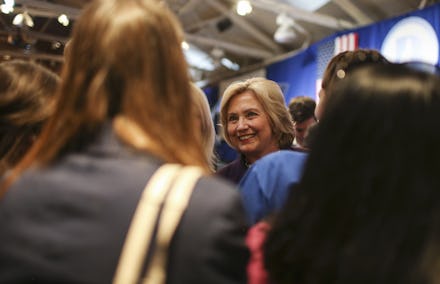Hillary Clinton's Campaign Officially Dropped Her Maiden Name. Here's Why That Matters.

Hillary Rodham Clinton is no more, at least for the time being. As an aide from the Clinton campaign confirmed on Monday, the Democratic presidential candidate has decided to drop the "Rodham" from her name and be identified simply as "Hillary Clinton," a move major news outlets such as the Associated Press, the New York Times and the Washington Post have agreed to honor.
"Until recently, the presidential candidate, former senator and secretary of state used all three names. It was how she had been known for many years. It was the name she used as an author and how she signed legal documents... as late as this summer," a media rep for the AP said on its website.
"However, the campaign has branded itself from the start as Hillary Clinton. When asked, the campaign says to go with Hillary Clinton."
For those who have followed Clinton's political career closely, the change might not seem like much of a change at all. As the AP press release mentioned, Clinton has signed up for primary ballots in several states without her maiden name and signed her signature that way.
Further, as the Washington Post detailed recently, Clinton has a decades-long history of going back and forth on calling herself Rodham. Although she took office as secretary of state in 2009 under the name Hillary Rodham Clinton, she went by Hillary Clinton during her 2008 presidential bid. In popular culture, she's often referred to without a last name at all; everyone knows who you're talking about when you refer to "Hillary."
But neither the public nor the media get to decide what Hillary Clinton's name is. She does. And by explicitly stating (more than once) exactly how she wishes to be identified in the press, that's the simple but critical point she's made.
She can be the one to call the shots by telling people what to call her.
What Clinton has demonstrated with her announcement is that she's the one to call the shots by telling people what to call her, allowing her to maintaining agency over a key element of her public persona. It's a strong, if not somewhat counterintuitive, message to send at a time when the number of brides who keep their own last names is on the rise.
Although a majority of women still take their husbands' names when they get married, according to the New York Times, a growing number are hyphenating, tacking on a new name or opting for hybrid surnames — which is what Clinton has done since the 1980s, when she first took on her husband's name in response to public opinion.
"I learned the hard way that some voters in Arkansas were seriously offended by the fact that I kept my maiden name," Clinton wrote in her 2003 memoir Living History. "Because I knew I had my own professional interests and did not want to create any confusion or conflict of interest with my husband's public career, it made perfect sense to me to continue using my own name."
But according to the Post, the name that seems most sensible for Clinton to use has changed over time, often depending on the desired political ends:
Well, it seems that when Clinton feels that a more traditional naming pattern might be a matter of protocol or politically advantageous — capable of helping her play down the traits for which she is most often criticized — she is Hillary Clinton. But when Clinton is operating in the private sector or safely ensconced in a public service position where there was no risk of voter backlash, she's Hillary Rodham Clinton.
Deciding which name to use based on professional goals is Clinton's prerogative, just as it is for innumerable other women who weigh career implications when they choose how they want to be known. As some feminist commentators have argued, choosing to take your husband's name isn't the best example of a wholly independent choice when there's still cultural pressure to do exactly that. But as Clinton has shown, the decision can be a tool for women depending on how or why they use it — either to achieve success, or simply to retain some sort of control over how other people see them.
Whether or not Clinton's decision to drop the Rodham is a political play or merely a way to solidify a decision she made a long time ago, as the Atlantic argues, her on-again, off-again relationship with her maiden name reflects the internal struggle many women still face in determining how to present themselves to the outside world. She's illustrated how fraught the choice can be when our names are evermore important not just IRL, but to our online personas too.
It might seem a small step for Clinton to tell people to call her by a name they've already used for years. But it still gives her the final say.